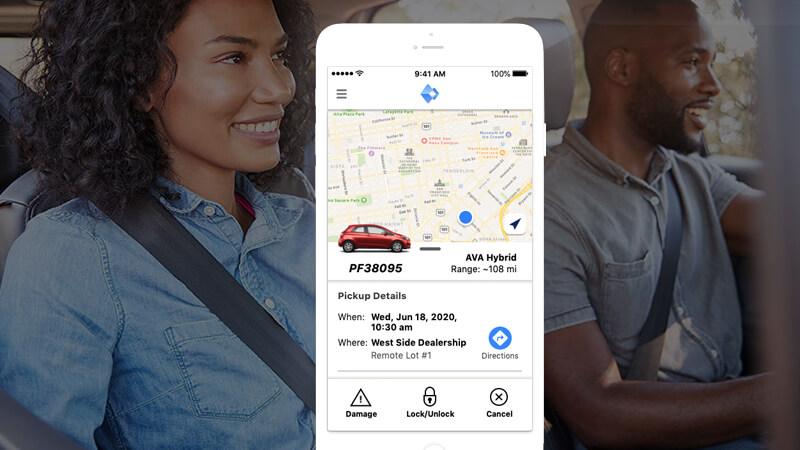
Car dealerships, like many businesses, have been hit hard by the COVID-19 pandemic. New car sales have decreased by 67.9% in the US, according to Cox Automotive, and 60-80% in Europe. The UK reported the lowest car sales since 1946. With 340,000 car leases coming due, people are trying to return cars to dealerships that already have full lots with many unsold cars. As the car-buying public becomes more hesitant to commit to a vehicle purchase or even to a multi-year lease, dealerships need to find new ways to make up the lost revenue and utilize the excess inventory.
Over the last decade, many millennials and city-dwellers chose shared mobility, such as ridehailing and carsharing over car ownership. Rather than have a car sitting idle in a paid parking space or driveway, these consumers preferred to reduce expenses as well as environmental impact and embrace the convenience of shared mobility options.
Those trends were already happening before the pandemic changed every aspect of the economy. New stay-at-home orders meant fewer people were commuting to work. However, the demand for delivery drivers spiked as people switched to ordering necessities online. Before the virus, grocery delivery was only 3% of the retail food market. Today, Amazon and Walmart grocery delivery sales have increased by at least two-thirds from last year, and Instacart orders have increased by 150%. Businesses that were normally people-intensive, such as retail and restaurants, have pivoted to contactless services.
What does all this mean for car dealerships?
People are buying fewer cars, and buying behaviors are evolving. Car dealerships must shift to new opportunities and business models in this new age of transportation to adapt to these changing behaviors.
No-Contact Test Drives
Prior to COVID-19, a test driving experience meant driving a car around a few blocks with a salesperson. With the social distancing norms in place, customers are now expecting solutions that keep them healthy and safe—be it taking a car for a test drive to driving just the right one home. Traditional test drives required close contact with salespersons, manually handing over driver’s licenses, credit cards, and insurance paperwork. With the Ridecell mobility platform, dealers can now provide automated access to test drives without needing a sales associate to accompany a customer, in a safe, secure, and modern way.

Here’s what that experience looks like:
- A customer downloads a dealer-branded app, creates an account, and submits the necessary information.
- The customer is then prompted to take a selfie and a picture of their driver’s license and credit card.
- The Ridecell platform verifies the driver’s license and credit card within a few minutes.
- The customer selects a vehicle and schedules a time and location for the test drive.
- The customer arrives at the location. The app directs them to the vehicle and enables them to unlock the car through keyless entry.
- The customer test drives the vehicle.
- After the test drive, the customer uses the app to end their booking, leaves the vehicle at the recommended location, and locks the car with the app.
- The software tracks the mileage, location, and usage.
- The dealer picks up the car, then cleans and sanitizes it for the next customer.
The software allows dealers to customize the experience, including offering customers extended test drives for a fee.
No-Contact Service Appointments
This same on-demand convenience of test drives can work for loaner cars as well. Service customers can reserve a loaner while their car is being serviced, offering speedier—and safer—checkout times since there’s no need to fill out paperwork or verify their driver’s license.
In this scenario:
- The customer drives up to the service center and leaves the keys in their car.
- Using the dealer’s app, the customer selects a loaner car, unlocks a loaner car through a keyless entry, and drives off.
- When the service is complete, the dealer notifies the customer via the app.
- The customer returns with the loaner vehicle, locks it using the app, and gets in their newly serviced car, which has been sanitized by the technician.
Short Commitment Offerings
With the current state of the economy, the car-buying public is becoming more hesitant to commit to a vehicle purchase or even to a multi-year lease. As consumers migrate from car ownership to alternatives requiring less commitment, dealers can leverage the Ridecell technology to offer a greater range of options—like weekly or monthly vehicle packages. Shorter commitment offerings let customers try out a car, which could hopefully lead to a longer-term purchase. In addition, the Ridecell ecosystem allows dealers to bundle insurance and maintenance into vehicle offerings easily.
Getting Started with a Shared Mobility Platform
To get started with a shared mobility platform, you’ll need:
- Hardware that provides a connection between vehicles and the services
- Software that maintains the operation of a complete user experience
- Insurance which provides critical protection to the asset (the car)
- Parking at either dealer lots or negotiated lots and/or spaces around the city
At Ridecell, we offer an end-to-end platform that provides all the functionality dealers need to take advantage of for building these new business opportunities. In addition to managing fleets and providing a superior customer experience, the Ridecell platform provides real-time monitoring, data stream integration, and advanced analytics for monitoring, adjusting, and scaling business services as needed.
We’ve also built a robust partner ecosystem that includes insurance companies, telematics hardware suppliers, and fleet servicing vendors to help you launch and scale your shared mobility services faster.
On April 16, 2020, we presented predictions for car dealerships of the future and how to thrive in this shifting market. Tune in to our webinar on ‘Dealership Success with Shared Mobility’ to explore in detail how dealerships can adapt their business to brace for the impact of COVID-19.
Author: Diptii Tiiku, Senior Director Corporate Marketing, Ridecell


